
November 16
1896 Birth: Oswald Mosley: Sir Oswald Ernald Mosley, 6th Baronet (born November 16, 1896, London, England—died December 3, 1980, Orsay, near Paris, France), English politician who was the leader of the British Union of Fascists from 1932 to 1940 and of its successor, the Union Movement, from 1948 until his death. Those groups were known for distributing anti-Semitic propaganda, conducting hostile demonstrations in the Jewish sections of east London, and wearing Nazi-style uniforms and insignia.
Mosley served in the House of Commons from 1918 to 1931, successively as a Conservative, an Independent, and a Labour Party member, serving in a Labour ministry in 1929-30. In 1931 he tried to form a socialist party but was defeated for reelection to Parliament. The next year he founded the British Union of Fascists, for which some enthusiasm was generated by his own powerful oratory and by the support of the newspaper publisher Viscount Rothermere. Interned after the outbreak of World War II, Mosley was released in 1943 because of illness. On February 7, 1948, he launched the Union Movement, which he described as an amalgam of 51 organizations, most of them right-wing book clubs.
Mosley married in 1920 Lady Cynthia Blanche Curzon (died 1933), daughter of the 1st Marquess Curzon of Kedleston; and in 1936 Diana Guinness (née Freeman-Mitford), a prewar apologist of Nazi Germany and a daughter of the 2nd Baron Redesdale. Mosley's autobiography, My Life, was published in 1968. (Britannica.com)
1900 Kaiser Wilhelm II: q
During a parade in Breslau, Germany (now Wroclaw, Poland, a woman threw a hatchet at the open carriage of Kaiser Wilhelm II. Selma Schnapke, later ruled to be insane, threw well enough that the "hand chopper" struck the imperial carriage, and was arrested. [For further details, Click here.]

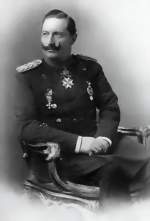
1914 World War I: New Fatherland League launched in Germany:
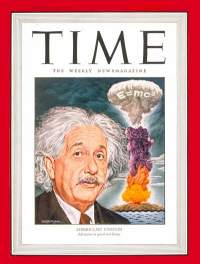
On this day in 1914 in Germany, a small group of intellectuals led by the physician Georg Nicolai launch Bund Neues Vaterland, the New Fatherland League.
One of the league's most active supporters was Nicolai's friend, the great physicist Albert Einstein. Together, Einstein and Nicolai had written a pacifist answer to the famous pro-war manifesto of October 1914, which had been signed by 93 leading German intellectuals from various fields, including the physicist Max Planck, the painter Max Lieberman and the poet Gerhart Hauptmann. When their counter-manifesto failed to attract much support, Nicolai and Einstein concentrated their efforts into the New Fatherland League.
First and foremost, the league argued, World War I, which had begun the previous August, should end promptly in favor of "a just peace without annexations." Secondly, an international organization should be established in order to prevent future wars. According to Dr. Franziska Baumgartner-Tramer, who attended some of the league's meetings, Einstein spoke "with great pessimism about the future of human relations . . . . I managed to get to him on one occasion, when I was depressed by the news of one German victory after another and the resultant intolerable arrogance and gloating of the people of Berlin. 'What will happen, Herr Professor?' I asked anxiously. Einstein looked at me, raised his right fist, and replied 'This will govern!'"
In July 1915, the New Fatherland League supported another declaration, signed by 91 prominent German intellectuals, opposing territorial annexations and calling for a compromise peace. This proved too much for German authorities, who raided the league's offices and prohibited its members from publishing any other documents or from even associating with each other. In the post-war years, however, the league resurfaced, and in 1922 it was renamed the German League for Human Rights, after a similar French organization dedicated to fostering German-French understanding.
Meanwhile, frustrated by the League of Nations' failure to enforce disarmament and prevent further international conflicts in the decades following World War I, Albert Einstein became one of the world's most powerful voices in support of pacifism. He was also committed to Zionism, the political movement aimed at creating a Jewish homeland in Palestine. When the state of Israel was created after World War II, its prime minister, David Ben-Gurion, offered Einstein the post of president. The great man declined, but remained deeply involved with Israel and with Jewish affairs until the end of his life. (History.com)

1915 World War I (Oct 4, 1915 - Feb 29, 1916): Gefreiter Adolf Hitler's serves with 16 Reserve Infantry Regiment at Fromelles. [For further details, Click here.]
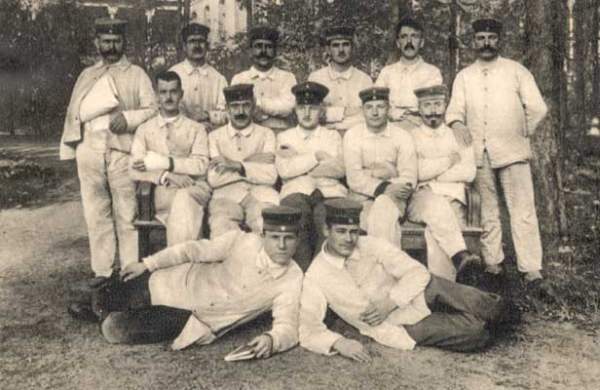
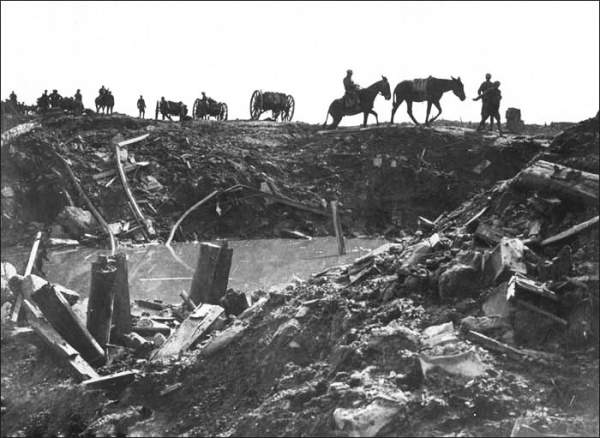
1918 World War I: Various: British and French warships enter the Black Sea:
The Allied governments now had to decide on their policy in the confused Russian situation. The original purpose of intervention, to revive an Eastern front against Germany, was now meaningless. Russian exiles argued that, since the pre-Bolshevik governments of Russia had remained loyal to the Allies, the Allies were bound to help them. To this moral argument was added the political argument that the Communist regime in Moscow was a menace to the whole of Europe, with its subversive propaganda and its determination to spread revolution. [For further details, Click here.]
Crown Prince Wilhelm to Paul von Hindenburg on the German Revolution:
Highly Honoured Field Marshal: In these most grievous days of our life, both for my father and for myself, I too must say goodbye to your Excellency. With deep emotion I have been obliged to decide to make use of the authority granted me by your Excellency to lay down my post as chief commander and to take up my residence in the first instance in a neutral country. I have only been able to force myself to this step after hard internal struggles, although it is repugnant to my whole nature not to be able to lead my brave troops home. I desire, however, once again briefly to explain my attitude. Contrary to many unjust opinions, which have always tried to represent me as a war instigator and a reactionary, I have from the beginning adopted the standpoint that this war was for us a war of defence. Again and again during 1916, 1917, and 1918 I made both oral and written representations to the persons concerned that Germany must endeavour by every means in her power to terminate the war and be glad at maintaining herself against the entire world on the basis of the status quo. In many conversations with General Ludendorff I for a long time pleaded for a wise peace by understanding, and expressed the view that the most favourable opportunity for attaining this end was reached when we occupied strong, powerful positions before and also during the spring offensive. As regards internal politics, I am the last person to oppose the liberal development of our Constitution. Only a few days ago I set forth this view in writing to Prince Max of Baden. Nevertheless, when the weight of events hurled my father from his throne, I was not only not heard, but was simply passed over as Crown Prince and as heir to the throne. No renunciation was either demanded from or made by me. Notwithstanding these facts my standpoint was to persevere at my post, and my ideal was, by holding my army group together, to avoid further causes of damage and disintegration for our Fatherland. The attitude of the present Government, however, was authoritative as to my remaining further at my military post. I had been informed by it that the Government did not count upon further military employment for me. Your Excellency will kindly also note that copies of this letter have been sent to the Minister of the royal house, the Prussian Ministry, the Vice-Presidents of the lower house, the President of the upper house, the Chairman of the Military Cabinet, and some friends of mine among the military leaders.
1933 United States and Soviet Union establish diplomatic relations: President Roosevelt sends a telegram to Maxim Litvinov, expressing hope that United States-Soviet relations would "forever remain normal and friendly.''
1937 Various: Holocaust:
Britain: The House of Commons votes to erect air-raid shelters in British cities.
1938 Holocaust: Neville Chamberlain suggests that Jewish refugees come to Britain as a temporary measure. (THP)
1939 Czechosolovakia: Martial law is declared in Prague after shootings by antifascists.
1940 World War II: Various: Balkans:
Its construction took many months to complete. The work was carried out by the construction firm Schmidt & Muenstermann, based on 8/3 Mars Street, which later helped building the Treblinka death camp. The ghetto wall was 3.5 m high, topped by glass and barbed wire. The Nazis did not use the term ghetto, but referred to the area as Juedischer Wohnbezirk (Jewish Quarter). A Juedischer Ordnungsdienst ("Jewish Order Service" / Jewish police force) was established and at its height, numbered 2,000 members. The leader of the Juedischer Ordnungsdienst was Josef Szerynski, a Polish police colonel who had converted to Christianity. He changed his name from Szenkman and developed an anti-Semitic attitude.[For further details, Click here.]
1941 World War II: Various: Joseph Goebbels attacks Winston Churchill:
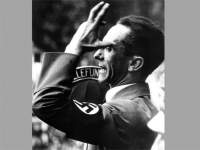
The neutral press has been asking recently how it is that Mr. Churchill has such influence on the English public and British public opinion. Despite the worst reversals and the most demoralizing defeats, regardless of initial suspicion, in the end they are captivated by this clever wordsmith and accept his foolish policies and military leadership. The question is both easy and hard to answer. The answer to the riddle is probably that although Mr. Churchill lacks all strategic sense in both politics and military leadership, he is an extraordinarily capable tactician. He is a virtuoso at democratic party and press leadership, and therefore is the best of the current English politicians, who as it is known are not gifted with any great intelligence. His methods are as primitive as one can imagine. His ideas are hardly original, and one can usually predict exactly what he will say or do. It is always the same thing with him. [For further details, Click here.]
Goebbels publishes his screed of hate:
On this day in 1941, Joseph Goebbels publishes in the German magazine Das Reich that "The Jews wanted the war, and now they have it"—referring to the Nazi propaganda scheme to shift the blame for the world war onto European Jewry, thereby giving the Nazis a rationalization for the so-called Final Solution.
Just two days earlier, British Prime Minister Winston Churchill, having read more than a dozen decoded messages from German police which betrayed the atrocities to which European Jews were being subjected, had written in a letter to the Jewish Chronicle that "The Jew bore the brunt of the Nazis' first onslaught upon the citadels of freedom and human dignity . . . . He has not allowed it to break his spirit: he has never lost the will to resist." And active Jewish resistance was increasing, especially in the USSR, where Jews were joining partisans in fighting the German incursions into Russian territory.
But it was proving too little too late, as Goebbels, Himmler, and the rest of Hitler's henchmen carried out with fanatical glee the "elimination of the Jews," using propaganda and anti-Bolshevik rhetoric to infuse SS soldiers with enthusiasm for their work. As Goebbels wrote in Das Reich: "[T]he prophecy which the Fuhrer made . . . that should international finance Jewry succeed in plunging the nations into a world war once again, the result would not be the Bolshevization of the world...but the annihilation of the Jewish race in Europe. We are in the midst of that process . . . Compassion or regret are entirely out of place here." (History.com)
Countdown to Infamy: Tokyo to Washington:
1942 World War II: From a letter from Reichsfuehrer SS Himmler addressed to General Pohl:
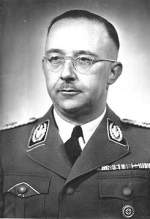
1944 World War II: Various: Churchill to de Gaulle:
I shall always recall as one of the proudest and most moving occasions of my life the wonderful reception which the people of Paris gave to their British guests on this our first visit to your capital since its liberation. I was also most grateful for the chance to see for myself something of the ardor and high quality of French troops, which are completing the liberation of their native soil under the skillful leadership of General de Lattre de Tasigny. The welcome extended to us was indeed a happy augury for that continued friendship between our two countries essential to the safety and to the future peace of Europe.
War in the Air: Operation Queen commences in Düren, Germany, with one of the heaviest Allied tactical bombing attacks of the Second World War. [For further information, click here]
1945 German scientists brought to United States to work on rocket technology:
In a move that stirs up some controversy, the United States ships 88 German scientists to America to assist the nation in its production of rocket technology. Most of these men had served under the Nazi regime and critics in the United States questioned the morality of placing them in the service of America. Nevertheless, the U.S. government, desperate to acquire the scientific know-how that had produced the terrifying and destructive V-1 and V-2 rockets for Germany during WWII, and fearful that the Russians were also utilizing captured German scientists for the same end, welcomed the men with open arms. Realizing that the importation of scientists who had so recently worked for the Nazi regime so hated by Americans was a delicate public relations situation, the U.S. military cloaked the operation in secrecy. In announcing the plan, a military spokesman merely indicated that some German scientists who had worked on rocket development had "volunteered" to come to the United States and work for a "very moderate salary." The voluntary nature of the scheme was somewhat undercut by the admission that the scientists were in "protective custody." Upon their arrival in the United States on November 16, newsmen and photographers were not allowed to interview or photograph the newcomers. A few days later, a source in Sweden claimed that the scientists were members of the Nazi team at Peenemeunde where the V-weapons had been produced. The U.S. government continued to remain somewhat vague about the situation, stating only that "certain outstanding German scientists and technicians" were being imported in order to "take full advantage of these significant developments, which are deemed vital to our national security."The situation pointed out one of the many ironies connected with the Cold War. The United States and the Soviet Union, once allies against Germany and the Nazi regime during World War II, were now in a fierce contest to acquire the best and brightest scientists who had helped arm the German forces in order to construct weapons systems to threaten each other. (History.com)

1948 Berlin Crisis: President Harry Truman rejects four-power talks on Berlin until the blockade is removed.
1959 The Sound of Music: Musical by Rodgers and Hammerstein based on The Story of the Trapp Family Singers, opens on Broadway at the Lunt-Fontanne Theatre. [For further information, click here]
1988 Baltics: Estonia's parliament declares the Baltic republic sovereign.
Edited by Levi Bookin (Copy editor) Click to join 3rdReichStudies Disclaimer: This site includes diverse and controversial materials--such as excerpts from the writings of racists and anti-Semites--so that its readers can learn the nature and extent of hate and anti-Semitic discourse. It is our sincere belief that only the informed citizen can prevail over the ignorance of Racialist "thought." Far from approving these writings, this site condemns racism in all of its forms and manifestations.
levi.bookin@gmail.com










Fair Use Notice: This site may contain copyrighted material the use of which has not always been specifically authorized by the copyright owner. We are making such material available in our efforts to advance understanding of historical, political, human rights, economic, democracy, scientific, environmental, and social justice issues, etc. We believe this constitutes a "fair use" of any such copyrighted material as provided for in section 107 of the US Copyright Law. In accordance with Title 17 U.S.C. Section 107, the material on this site is distributed without profit to those who have expressed a prior interest in receiving the included information for research and educational purposes. If you wish to use copyrighted material from this site for purposes of your own that go beyond 'fair use', you must obtain permission from the copyright owner.
Please Note: The list-owner and the moderator of 3rdReichStudies are not responsible for, and do not necessarily approve of, the random ads placed on our pages by our web server. They are the unfortunate price one pays for a 'free' website.



